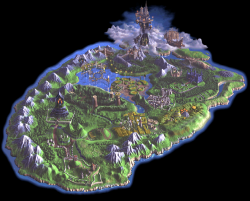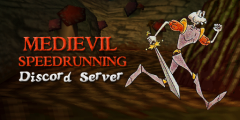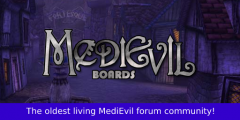Gallowmere
Gallowmere was one of the nine kingdoms of Medieval Britain. It was famed for its lush green countryside, fair rulers and kindly people.[1] It was home to many mystical, mythical creatures, like Dragon Toads, Rhinotaurs, and Dragon Birds.
| Kingdom of Gallowmere | ||
|---|---|---|
 | ||
| Religion | Christianity | |
| Government | Feudal monarchy (? - 1286) | |
| Monarchs | Peregrin's father (? – 1236) Peregrin (1236 – 1286) | |
| Era | Medieval | |
| Currency | Gold | |
Etymology
The exact origin of the name "Gallowmere" is unknown. Additionally, it is unknown whether the name was used to describe the land prior to the establishment of the kingdom of Gallowmere.
The name Gallowmere seems to be a combination of the words "gallows" and "mere." Gallows are a structure, typically of two uprights and a crosspiece, for the hanging of criminals. Mere is a body of standing water, such as a lake, pond, or wetland. More specifically, it refers to a lake that is broad in relation to its depth. Another definition for the word mere is "a boundary-marker; boundary-line."
Therefore, one reading of the name Gallowmere could be understood as "the lake by the gallows." The gallows may refer to the preferred execution method of the land’s criminals, as indicated by the hanged men in the Gallows Gauntlet, while mere could be the Lake that the town of Mellowmede was built upon. Alternatively, mere could refer to the flood lands, later known as the Pools Of The Ancient Dead.
History
Early history
Some of the earliest inhabitants of the land of Gallowmere were likely the ancients, the creators of the Rune Stones, as evidenced by the rune carvings on the Mystic Maidens standing stones.[1]
Dragons also made their home in Gallowmere; they fashioned the Dragon Gate in the Gallows Gauntlet after the Serpents, who they possibly worshipped.[2][2.1] The Dragons procreated with numerous other creatures, resulting in various hybrids that would reside in Gallowmere until at least the late 14th century.[2.2]
A known early settlement was Mellowmede, an arcane town built around a lake, whose inhabitants were besieged by Rhinotaurs, creatures awoken from their hibernation in the nearby Crystal Caves.[2.3] The sinking of the town and the killing of its people would be remembered as the Massacre of Mellowmede.[3][3.1]
At another point in Gallowmere's history, the land was occupied by the Roman Empire.[4] Some remnants of the time, including a mural of a Roman soldier in the Gallows Gauntlet, could still be seen in the 14th century.
Kingdom of Gallowmere
Eventually, the kingdom of Gallowmere was established (if it had not existed before). The kingdom was seemingly peaceful throughout the majority of its existence, as one text indicates that by the late 1200s "Gallowmere had not seen a war in many centuries."[5]
This all changed during the reign of King Peregrin. For 50 years the kingdom prospered under his rule, until the crops in the kingdom began to inexplicably fail one year. The king's attempts at preventing a famine were in vain as disaster struck at every turn. Surprisingly, all the troubles disappeared once the king hired Zarok the Sorcerer as his new court magician. Unbeknownst to the king, this was all part of Zarok's plan to take over the kingdom.[1]
War with Zarok
- Main article: Battle of Gallowmere
In 1286, Zarok began his conquest of Gallowmere. His initial attack on Castle Peregrin was thwarted by Sir Daniel Fortesque. The war finally ended at the Battle of Gallowmere where Zarok was defeated. However, this was a pyrrhic victory for Gallowmere, as many young men were lost in the fight. Worse still, King Peregrin died just days after the battle by choking on a brussels sprout, leaving the kingdom leaderless.[2.4]
Decline and Zarok's Return
- Main article: Zarok's Return
After the death of King Peregrin, the kingdom seemed to enter into a state of decline. By 1386, Castle Peregrin, once Gallowmere's seat of power, lay abandoned as a haunted ruin. The kingdom's necropolis also seemed to fall into disrepair by this point – the pillars inside the crypt of the Hero of Gallowmere had collapsed, the bridge to the Hilltop Mausoleum was not well maintained and on the brink of collapsing, and a portion of the graveyard became home to a family of wolves.
The sorcerer Zarok, who was not killed in the battle a century prior, made his return and began his second attempt at conquering the land. Unfortunately for the sorcerer, he accidentally brought back his nemesis Sir Dan, who journeyed through the decaying land and killed the sorcerer once and for all.
Legacy
It is likely that Gallowmere was eventually absorbed into a bigger kingdom, most probably the Kingdom of England. The body of Gallowmere's hero, Sir Daniel Fortesque, was recovered and moved to a museum in London where he remained until 1886.[6] By the 21st century, the exact location of Gallowmere was largely unknown.[1]
Geography
Gallowmere was a mountainous, forested land with several lakes and rivers, and one dormant volcano.
Biodiversity
Gallowmere was home to unique plant and animal life with the greatest concentration of biodiversity being in the Enchanted Earth, and in and around the sunken town of Mellowmede, including its surrounding lake. Several animal species in Gallowmere, namely the Dragon Birds, Dragon Toads, and Elephant Dragons were crossbreeds or descendants of Dragons.[2.5][2.2] Unfortunately, some species, such as Gallowmere's wolves, were hunted to extinction.[2.6]
Human geography
Notable settlements
Gallows Town was a town lying near the centre of Gallowmere. Its inhabitants were possessed by Zarok in 1386, but were freed shortly after. The town had a library, church, pub and smithy.
Peregrin Castle was once Gallowmere's seat of power and home to the royal household, before it fell to ruin and became abandoned. There was lava underneath the castle which was held back by a set of floodgates. The castle was completely destroyed after the lava was released in 1386.
Mellowmede was once a town of arcane alchemy, before being destroyed by Rhinotaurs and flooded by the murky swamps. The ancient people of this long vanished town once sought to harness the power of Crystals within the Crystal Caves. Mellowmede resurfaced in 1386 due to Zarok's magic. It is unknown whether it remained on the surface after the sorcerer's defeat.
The City of Madness was a city built by Zarok using science. The city was home to many of his obscure inventions, including his boiler guards. Another notable invention was a train, which he used to travel around the city faster. In the middle of the city lied Zarok's Lair, his personal domain. Both the lair and city exploded in 1386.
Government
- Main article: Monarchy of Gallowmere
In the Middle Ages, Gallowmere was one of a number of feudal kingdoms making up Britain. However, after the death of King Peregrin, there was seemingly no immediate transfer of power and the kingdom was left leaderless. The only remaining form of government was found in the settlement of Gallows Town where the people had elected a mayor.
Military
Due to war not being prevalent in the region during the early medieval period, Gallowmere seemingly didn't have a large standing army. The role of the King's Champion was seen as purely honorary.[5] Instead, the king relied on his Court Magician to repel potential attackers.[1] He also had his royal guard for personal protection as well as scouts for intercepting enemy forces.[1]
When the renegade sorcerer Zarok raised an army of demons to take over the land in 1286, the King's Champion led the militia into battle against this unholy horde. Gallowmere lost a whole generation of young men in said battle against the sorcerer. The King himself died soon after, leaving the kingdom leaderless and with greatly diminished military forces.
Economy
During the medieval period, Gallowmere mostly had an agricultural economy. The farmers would grow wheat, corn, and pumpkins in their fields and keep farm animals such as chickens. Gallows Town, the largest remaining settlement in the late 14th century, had a fish market and a smithy.
Tourism
Though it is unknown how many tourists Gallowmere had during the 14th century, a two part Tourist Guide to Gallowmere had been produced to incentivise more tourism in the country. Both parts of the guide could be found in the Gallows Town library.
Science and technology
Gallowmere's human population enjoyed technological advances far beyond what was common in the medieval era. This included the Corn cutting machine used to harvest corn by the farmers, and the street lamps and iron gutters found in Gallows Town.
The Imps had their own technology, specifically the Mecha Imps, which they used to steal produce from the land's farmers.[2.7]
A notable scientist and inventor was the sorcerer Zarok. Zarok created a steam locomotive, a time machine,[2.8] and artificial soldiers known as Boiler Guards. However, most of Zarok's inventions were confined to his domain, which was destroyed in 1386, and most of his creations were presumably destroyed along with it.
Culture
Cuisine
Pumpkin was said to be Gallowmere's favourite dish during the late medieval period.[7][7.1]
Literature
Most literature produced in Gallowmere was of a historical or promotional nature:
- The four volume History of Gallowmere detailed the events of 1386, albeit with some embellishment.
- Heroes from History: A Retrospective was a thick volume about Gallowmere's greatest heroes.
- The Tourist Guide to Gallowmere served as an advertisement for the land's most beautiful and interesting locales.
Media
At least one publication existed in Gallowmere back in the 14th century - Blacksmith's Monthly.[7]
Other, less reliable historical sources allege the existence of more publications - Elbows Akimbo, The Mongolian, My Hero Weekly, and Cheerio!.[3]
Music
The Mausoleum atop Cemetery Hill had an organ. It is said that by the 14th century, the only one playing it was the resident ghost.
Religion
- Main article: Religion in Gallowmere
The human population of Gallowmere appeared to mainly practice Christianity. Other creatures such as Dragons and the Toad Demons of Mellowmede practiced their own religions.
Sport
Beginning with the coronation of King Peregrin, the Gallowmere Games began to be observed annually. This was a competitive sporting event where the land's most skilled warriors showed off their skills in various categories, such as archery.[1]
It is said that King Peregrin and his Champion, Sir Daniel Fortesque, enjoyed playing croquet together.[7.2]
Symbols
The symbol most prominently associated with Gallowmere was a jawless skull. Such a skull appeared on many of the shields in the country, including the Gold Shield of renowned hero Karl Sturnguard. It also appeared on the gold coins used as currency in the kingdom.
Skulls with jaws were another prominent symbol, as the king himself sat on a skull throne. The exterior of the crypt of the Hero of Gallowmere was decorated with a skull as well.
Visual art
Art decorated many of the interiors and exteriors of Gallowmere. Much of the art throughout the realm was macabre and grotesque.
Pre-medieval art and architecture
One of the earliest examples of architecture and art in the land were likely the Mystic Maidens standing stones. Though unconfirmed, they were most probably created by the ancients who created the Rune Stones, as the Rune symbols were carved into them.[1] Rune Stones came into widespread use throughout the land as the keys to locks. Rune Stones were still used in Gallowmere well into the late 14th century.
Another ancient architectural piece was the Dragon Gate. Unlike the vast majority of art in Gallowmere, the gate was produced by Dragons instead of humans. It is possibly a form of religious art, as the Serpents were said to be worshipped, though it is unclear by whom.
There was a mural of a Roman soldier found in the Gallows Gauntlet which possibly dated back to the Roman occupation of Gallowmere.[4]
Medieval art and architecture
It is unknown when Peregrin Castle was first erected, but it is said to have been the ancestral home of a long line of kings.[3.2] By 1386, the castle had been allowed to fall into ruin.
The crypt of the fallen hero Sir Daniel Fortesque, built in the late 13th century, was richly decorated with elaborate wooden sculptures and wall art.
Also of note was the mausoleum atop Cemetery Hill. It had beautiful stained glass windows depicting various figures, objects, and animals. The centre room featured a depiction of a gorgon's head on the floor.
Another example of Gallowmere's architecture was the imposing insane asylum building with its hedge garden. The garden was decorated with hedges shaped like animals and buildings. Inside the asylum itself, there were several fresco paitings. One such painting depicted the asylum's head monk whilst another depicted two devilish angels playing musical instruments.
Behind the scenes
Development
MediEvil (1998)
At an early development stage, Gallowmere was called Millennium, likely after the development studio itself.[8]
Gallowmere's map underwent significant changes during development. In MediEvil 0.28, the map still featured The Muddy Riverbank, a cut level. The Lake and The Gallows Gauntlet were not depicted on this version of the map. There was also a path leading from the Scarecrow Fields to The Sleeping Village.
In MediEvil 0.29, The Muddy Riverbank was removed from the map and replaced with The Lake. The path leading from Scarecrow Fields to The Sleeping Village was removed as well. In addition, The Gallows Gauntlet was added to the map.
It is unknown when exactly the final version of the map arose, but it can first be seen in MediEvil Reviewable Version. The final map is nearly identical to the version from 0.29, but it depicts interior levels, specifically The Crystal Caves, The Time Device and Zarok's Lair.
In other media
- Main article: List of MediEvil references in other media
2023 – Clive 'N' Wrench
In the Graveyard themed level A Grave Mistake, a broken sign can be found that says "Welcome to Gallow-"
Gallery
Map of Gallowmere in MediEvil: Resurrection.
In other languages
| Language | Name | Meaning |
|---|---|---|
| French (France) | Potencie (MediEvil: Resurrection) | From French "potence" (Gallows) |
| Japanese | ガロメア Garomea |
Garomea (Gallowmere) |
References
- ↑ 1.0 1.1 1.2 1.3 1.4 1.5 1.6 1.7 MediEvil: The Game Prequel. Written by Chris Sorrell. Art by Jason Wilson. Published by Titan Comics in 2019.
- ↑ MediEvil. Developed by Other Ocean Emeryville. Published by Sony Interactive Entertainment on October 25, 2019.
- ↑ Serpent of Gallowmere entry in the Book of Gallowmere in MediEvil. Developed by Other Ocean Emeryville. Published by Sony Interactive Entertainment on October 25, 2019.
- ↑ 2.2.0 2.2.1 Elephant Dragons entry in the Book of Gallowmere in MediEvil. Developed by Other Ocean Emeryville. Published by Sony Interactive Entertainment on October 25, 2019.
- ↑ Rhinotaurs entry in the Book of Gallowmere in MediEvil. Developed by Other Ocean Emeryville. Published by Sony Interactive Entertainment on October 25, 2019.
- ↑ King Peregrin entry in the Book of Gallowmere in MediEvil. Developed by Other Ocean Emeryville. Published by Sony Interactive Entertainment on October 25, 2019.
- ↑ Dragon Toads entry in the Book of Gallowmere in MediEvil. Developed by Other Ocean Emeryville. Published by Sony Interactive Entertainment on October 25, 2019.
- ↑ Graveyard Wolves entry in the Book of Gallowmere in MediEvil. Developed by Other Ocean Emeryville. Published by Sony Interactive Entertainment on October 25, 2019.
- ↑ Mecha Imps entry in the Book of Gallowmere in MediEvil. Developed by Other Ocean Emeryville. Published by Sony Interactive Entertainment on October 25, 2019.
- ↑ Loading screen: "Zarok seeks to expand his reach beyond the confines of time. Just think of where he could go. Modern London? Egypt? The possibilities are endless!" in The Time Device in MediEvil. Developed by Other Ocean Emeryville. Published by Sony Interactive Entertainment on October 25, 2019.
- ↑ 3.0 3.1 MediEvil: Resurrection. Developed by SCEE Cambridge Studio. Published by Sony Computer Entertainment on September 1, 2005.
- ↑ Death: "Business hasn't been this brisk since the great Massacre of Mellowmede, I may have to take on an intern." in Return to the Graveyard in MediEvil: Resurrection. Developed by SCEE Cambridge Studio. Published by Sony Computer Entertainment on September 1, 2005.
- ↑ Zarok: "Ah, the Castle! Ancestral home to a long line of kings, last relic of a more noble time." in Cutscene in MediEvil: Resurrection. Developed by SCEE Cambridge Studio. Published by Sony Computer Entertainment on September 1, 2005.
- ↑ 4.0 4.1 "Since MediEvil 2 was in Victorian London, its fair to say that Gallowmere must have been a 'Dark Ages' realm somewhere in Europe and hence somewhere most likely ruled by the Roman empire a good while before that? :)" — Chris Sorrell, MediEvil developers - Q&A; on MediEvil Boards. Published May 7, 2013.
- ↑ 5.0 5.1 MediEvil manual. Written by Jim Sangster. Designed by Steve O'Neill. Published by Sony Computer Entertainment in October 1998. Download.
- ↑ MediEvil 2 manual. Written by Jim Sangster. Designed by Steve O'Neill. Published by Sony Computer Entertainment America in May 2000. Download.
- ↑ 7.0 7.1 MediEvil. Developed by SCEE Cambridge Studio. Published by Sony Computer Entertainment on October 9, 1998.
- ↑ TOURIST GUIDE TO GALLOWMERE - Part 1: "Pumpkin is Gallowmere's favourite dish, and about now the valley is just bulging under the weight of young podlings awaiting harvest." in The Sleeping Village in MediEvil. Developed by SCEE Cambridge Studio. Published by Sony Computer Entertainment on October 9, 1998.
- ↑ Bloodmonath Skull Cleaver: "You, you spend most of your time organising the changing of the guard and playing croquet with the king." in Hall of Heroes in MediEvil. Developed by SCEE Cambridge Studio. Published by Sony Computer Entertainment on October 9, 1998.
- ↑ Especial MediEvil - El nacimiento de una leyenda (o casi) in Hobby Consolas No. 70 (archived version at Archive.org). Published July 1997 by Axel Springer España.
| ||||||||||||||
Gaming Wiki Network
 Discord • Twitter |
The GWN is an affiliation between independently-hosted wikis about video games. | ||
|
We are also affiliated with:
| |||





